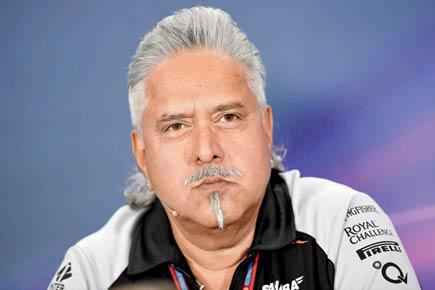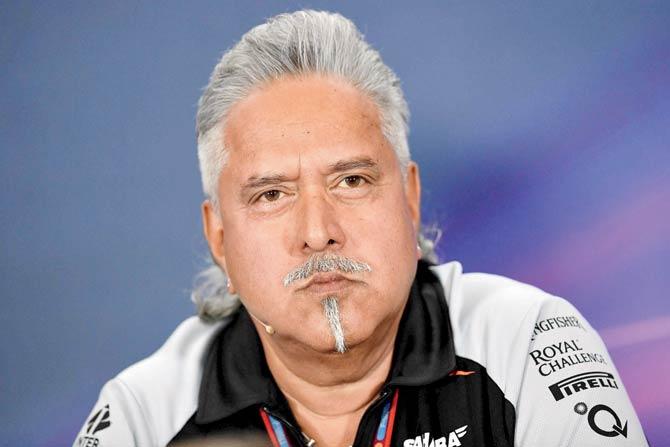After Vijay Mallya stated that he was willing to return to India and respect the country's judicial system but could not do so because of the revocation of his passport, a senior government official said on Thursday that all that the beleaguered liquor baron has to do for this is to approach the nearest Indian mission and get an emergency certificate


Vijay Mallya
ADVERTISEMENT
New Delhi: After Vijay Mallya stated that he was willing to return to India and respect the country's judicial system but could not do so because of the revocation of his passport, a senior government official said on Thursday that all that the beleaguered liquor baron has to do for this is to approach the nearest Indian mission and get an emergency certificate.
"Any Indian citizen who is outside India and who does not have a valid travel document for any reason, only has to approach the nearest Indian embassy or high commission and apply for an emergency certificate," External Affairs Ministry spokesperson Vikas Swarup said in his weekly media briefing here.
"Emergency certificate is specifically meant to provide a travel document to an Indian citizen to return to India," he said.
"This facility is available to Mallya should he wish to apply for it."
Mallya is reported to be in London since he left India on March 2 ahead of the SBI-led banks' consortium petitioning the Supreme Court to recover their outstanding loans amounting to Rs.9,431.65 crore, including interest that were sanctioned to his now-defunct Kingfisher Airlines Ltd.
Mallya in an e-mail to his lawyer has expressed his willingness to return to India and respect the country's judicial system.
An hour before hearing on September 9, Mallya sent the e-mail to his defence counsel Ajay Bhargava asking him to file a plea seeking exemption from personal appearance before a Mumbai court hearing a case of alleged violation of foreign exchange rules on his behalf.
"I request you to kindly appear before the learned judge on the said date on my behalf and file an exemption application requesting the judge to kindly dispense with my personal presence on the said date of hearing (September 9)," Mallya wrote in the mail.
"I request you (defence counsel) to also kindly convey to the learned judge that I have the utmost respect for his authority and towards the judicial systems of the country, in general," Mallya said in the mail.
"However, in the given circumstances, despite my best intentions to obey the order of the learned judge, I find myself incapacitated to travel to India, at this moment, even though I am making all the efforts to have the said revocation of my passport set aside."
On July 9, the court had asked Mallya to personally appear before it on September 9, after allowing the Enforcement Directorate (ED) plea to withdraw the exemption given to him from personal appearance in the case.
Mallya's counsel Ajay Bhargava moved a plea seeking exemption from his personal appearance and told Chief Metropolitan Magistrate Sumit Dass that his client is living in London.
Defence counsel apprised the court that Mallya's passport had been suspended by Indian passport authorities in April.
On April 23, his passport was revoked without even affording a personal hearing which he had requested for, the court was told.
"... ever since the revocation of his passport, the applicant (Mallya) has been staying in London and is not in possession of any requisite travel document which could possibly enable him to travel to India," Mallya's counsel said.
The counsel said that Mallya had urged the court to allow him to be represented by his lawyer to continue with the final arguments and save the court's precious time.
Public Prosecutor Navin Matta told the court that Mallya is evading questioning and proceedings in other matters pending against him.
The court allowed Mallya's plea for exemption for September 9 and sought a reply from the Enforcement Directorate. It fixed October 4 for further hearing in the case.
During the last hearing, the court had allowed the ED plea to seek recall of a court order that granted permanent exemption from appearance to Mallya, who faces money laundering charges in India.
The court was hearing the final arguments in the 2000 case related to alleged violation by Mallya of provisions of the erstwhile Foreign Exchange Regulation Act (FERA) in arranging funds to advertise his company's liquor products abroad.
According to ED, Mallya had allegedly paid $200,000 to a British firm for displaying the Kingfisher logo in the Formula One World Championships in London and some European countries in 1996, 1997 and 1998.
 Subscribe today by clicking the link and stay updated with the latest news!" Click here!
Subscribe today by clicking the link and stay updated with the latest news!" Click here!






